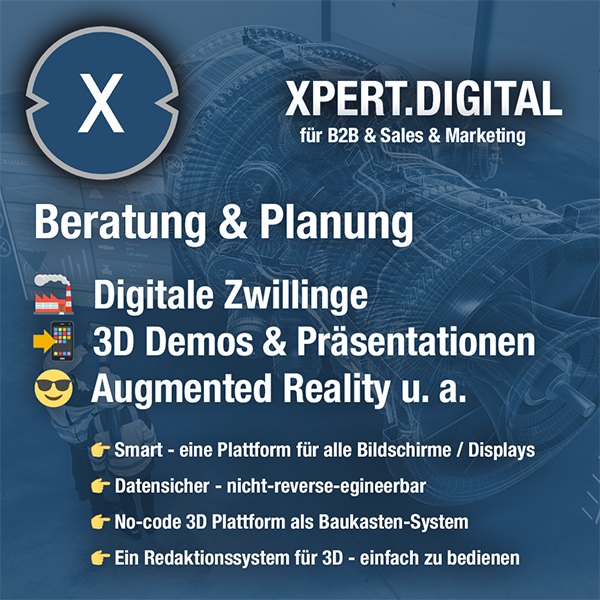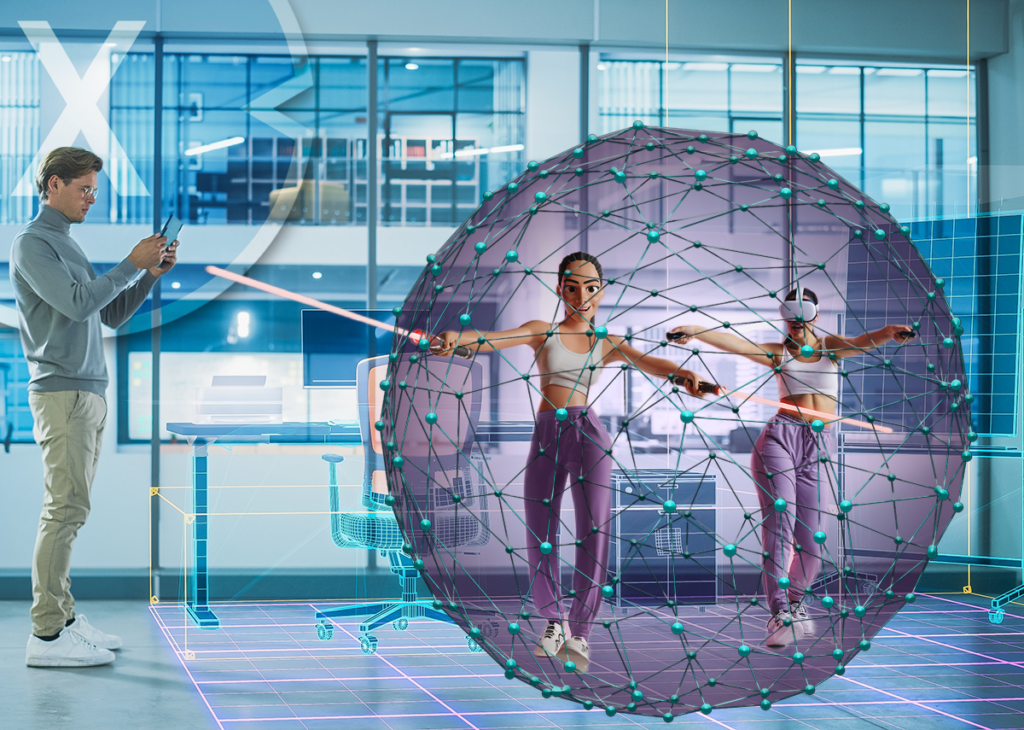Meta Artemis Ki-Chip and Artemis AR glasses
Xpert pre-release
Language selection 📢
Published on: January 25, 2025 / update from: January 25, 2025 - Author: Konrad Wolfenstein
Future -oriented: Ki -chip meta artemis and the expanded reality - research
Meta platform and the introduction of the AI processor Artemis
Meta Platforms plans to use his specially developed AI processor with the code name Artemis in his data centers in the current year. This step represents an important milestone in the corporate strategy, which aims to reduce the dependence on third-party providers such as Nvidia and further develop the group's AI infrastructure. At the same time, implementation will bring significant advantages in terms of efficiency, cost savings and performance.
Artemis: Metas in-house development for AI workloads
The AI processor Artemis is the second generation of Metas in-house developed AI chips and a direct successor to the META Training and Interence Accelerator (MTIA). This new hardware is especially optimized for inference workloads, which play a central role in the operation of AI models on platforms such as Facebook, Instagram and WhatsApp.
Technological highlights from Artemis
- Manufacturing process: Made by TSMC (Taiwan Semiconductor Manufacturing Company) using a state-of-the-art 5-NM process.
- Performance: three times higher performance compared to the previous model.
- Optimization: specially tailored to ranking and recommendation algorithms that are of strategic importance for meta.
With these adjustments, Artemis is perfectly tailored to the special requirements of Metas services. This enables data to process data more efficiently and to ensure higher speed and accuracy when providing content and recommendations.
The strategic importance of artemis
The step towards the in-house production of AI chips is part of a long-term strategy of META that pursues several central goals:
- Reducing the dependence on third-party providers: So far, Meta has been strongly dependent on external providers such as Nvidia to cover his AI needs. The company can now act more independently with Artemis.
- Selecting costs: Involved chips offer the option of minimizing the running costs for hardware and energy. It is estimated that the annual energy costs could only be reduced by hundreds of million dollars by using artemis.
- Increasing efficiency: Due to the targeted use of Artemis, Meta can significantly improve the performance of its AI infrastructure and perform tailor-made workloads that are only possible with commercial GPUs.
- Technological leadership role: The development and implementation of one's own AI hardware underpins Metas claim to play a pioneering role in the field of AI technologies.
Artemis in combination with GPUS
Despite the in -house development of Artemis, Meta will continue to rely on commercial GPUs in order to achieve an optimal balance between performance and efficiency. In areas that require high computing services, as in the training of new AI models, GPUs from third-party providers remain indispensable.
Effects on the operation of Meta
The introduction of artemis will have a significant impact on METAS operation and finance:
- Energy savings: The more efficient processing of data can drastically reduce energy costs.
- Reduction of hardware costs: The need for expensive third-party chips will decrease significantly, which enables potentially savings in billions in billions.
- Increase in performance: The optimization of the AI workloads will lead to improved performance in METAS core applications, especially for recommendation and ranking models.
These developments are not only significant from a technical point of view, but also for the long -term competitiveness of META. With Artemis, the company is better positioned in order to meet the increasing requirements in the area of AI.
A look into the future: future developments at Meta
Although Artemis was primarily designed for inference workloads, Meta is already working on other processors that are specially designed for AI training workloads. This illustrates the company's comprehensive strategy to optimize your own AI infrastructure in all areas.
In addition to hardware development, Meta also invests heavily in software solutions. Projects such as Pytorch and Triton play a central role in increasing the efficiency and scalability of the AI workloads. These investments show that META not only aims at a technological leadership role, but also to a close integration of hardware and software solutions.
Long-term plans with third-party hardware
Despite the progress at Artemis, Meta plans to continue to rely on commercial hardware. An example of this is the planned purchase of 350,000 NVIDIA H100 chips in 2024. This strategic decision underlines the importance of a hybrid infrastructure, which includes both own developments and proven standard solutions.
Meta Artemis: The next generation of augmented reality glasses
In addition to the progress in the field of AI hardware, Meta also pursues ambitious plans in the field of augmented reality (AR). The Meta Artemis project plays a key role, which is supposed to pave the way for a completely new generation of AR glasses.
Planned publication and goals
- Publication date: The market launch of Meta Artemis is planned for 2027.
- Technological vision: The aim is to create a full-fledged AR experience that could possibly even replace smartphones.
- Independence: The glasses should be able to carry out applications independently without being dependent on a smartphone.
Technological challenges
Meta faces several hurdles in developing Artemis:
- Cost efficiency: Production costs must be reduced to enable widespread market introduction.
- Display technology: Advances in display quality are critical to ensuring an immersive AR experience.
- Mass production: Scaling production remains a key challenge.
The Artemis AR glasses are expected to be significantly lighter and more powerful than previous models such as the Orion prototype. It is an essential part of Meta's long-term strategy to seamlessly connect the virtual and real worlds. If development goes as planned, Meta could achieve a breakthrough in the field of augmented reality with Artemis.
Suitable for:
The Importance of Artemis for Meta Platforms
With Artemis, Meta is pursuing a two-pronged strategy: On the one hand, developing its own AI processors increases efficiency and independence in the area of AI infrastructure. On the other hand, with the development of innovative AR glasses, the company is showing its ambitions to be a leader in other technological fields.
The investments in Artemis - in both the AI and AR areas - are part of an overarching vision: Meta not only wants to use future technologies, but also actively shape them. The company relies on a combination of technological innovation, strategic partnerships and long-term thinking. It remains exciting to see how these developments will impact Meta's market position and the technology industry as a whole in the coming years.
🗒️ Xpert.Digital: A pioneer in the field of extended and augmented reality
Augmented Reality meets AI: Meta's visionary innovations - background analysis
Meta's own development of AI chips and a look into augmented reality
Meta Platforms, a technology giant that shapes our digital lives, is in the midst of a comprehensive transformation process. This change is driven by the desire to strengthen its technological independence, increase its operational efficiency and push the boundaries of what is possible in the field of artificial intelligence (AI). A central element of this strategy is the development of our own, tailor-made hardware solutions that are intended to meet the high requirements of Meta's AI-supported platforms. In addition to this development in the area of computing power, Meta is also increasingly turning its attention to the area of augmented reality (AR), with the development of real AR glasses under the code name Artemis.
In Greek mythology, Artemis is the goddess of the hunt, the moon, virginity and nature. Although she remained a perpetual virgin herself, Artemis was also seen as a patron goddess of childbearing women because she helped give birth to her twin brother Apollo Leto.
Artemis: Meta's second step towards AI hardware autonomy
An important milestone in this development is the introduction of the AI processor with the code name Artemis. This chip, which is to be used in the company's own data centers this year, is the second generation of METAS AI hardware and follows the “Meta Training and Interence Accelerator” (MTIA). While MTIA focused primarily on training of AI models, Artemis is especially optimized for the inference. This means that he is responsible for the quick and efficient execution of AI models that are essential for the operation of metas such as Facebook, Instagram and WhatsApp. These models are the key to functions such as personalized feeds, targeted advertising and the moderation of content.
The Artemis chip, manufactured by TSMC using the 5-nanometer process, represents a significant improvement over its predecessor. It is said to offer three times higher performance, which will significantly increase the efficiency of AI workloads. The optimization of the chip is particularly aimed at the specific requirements of Meta, especially ranking and recommendation models. This means the chip is designed to do an even better job of executing the algorithms that determine what content is shown to users and what products are recommended to them.
The strategic importance of artemis
The development of Artemis is not only a technical advance, but also a strategic move by Meta. The company is pursuing several goals with the in-house development of AI chips:
Reduction of dependence on external providers
In particular, the dependence on companies like Nvidia, which dominate the market for AI accelerators, should be reduced. Through in-house development, Meta is trying to make itself more independent of the market's price and availability fluctuations and to better control its own hardware roadmap.
Reducing energy costs
Data centers consume immense amounts of energy, especially when running AI applications. The increase in efficiency through specially developed chips such as Artemis is intended to significantly reduce energy consumption and thus operating costs.
Optimizing the efficiency of AI workloads
Because Artemis is tailored to Meta's specific needs, it enables AI applications to run more efficiently compared to general purpose chips. This results in improved performance while reducing costs.
Security and control
By developing its own hardware, Meta can increase control over its supply chains and better ensure the security of its data.
Meta plans to use Artemis in combination with commercial graphics processing units (GPUs) to achieve a balance between performance and efficiency. This makes it clear that although the company relies on in-house development, it will still draw on the advantages of established technologies to create a comprehensive and powerful AI ecosystem.
The impact of Artemis on Meta's operations
The launch of Artemis will have a positive impact on Meta's business in several areas:
Significant savings in energy costs
The use of Artemis is expected to reduce annual energy costs by several hundred million dollars. Optimizing energy efficiency is an essential factor for the long-term sustainability of operations.
Reducing chip costs
Reliance on expensive third-party chips will be reduced by using Artemis, which will result in significant cost savings. These savings can be reinvested in other areas of the company, such as research and development of new technologies.
Improving AI application performance
The performance of Meta's AI applications, especially the recommendation models, is expected to improve significantly through optimization with Artemis. This leads to a better user experience and therefore higher user loyalty on the platforms.
The future development of Meta's AI hardware
Although Artemis was designed specifically for inference workloads, Meta continues to invest in developing processors for AI training workloads. These investments demonstrate the company's long-term commitment to AI hardware. Meta relies on a mix of hardware and software development, including initiatives such as PyTorch and Triton, to continuously optimize its AI infrastructure. PyTorch is an open source machine learning framework that is popular in the AI community and enables Meta to efficiently develop and train its own AI models. Triton is a programming language for writing custom, high-performance machine learning kernels.
The launch of Artemis is a significant step for Meta, allowing the company to better control the cost and performance of its AI infrastructure. However, it is important to emphasize that Meta will continue to use a combination of homegrown and commercial chips. For example, the company has announced that it will acquire 350,000 Nvidia H100 chips in 2024. This decision highlights the need to strike a balance between custom solutions and industry-standard hardware components in the rapidly evolving AI landscape. Meta seems to understand that no single solution can address all challenges and that it is important to respond flexibly to the changing needs of the market.
Meta's second Artemis: The leap into augmented reality
In addition to the AI chip development, Meta is also pursuing the development of augmented reality (AR) glasses with the code name Artemis. These AR glasses, planned for a market launch in 2027, are said to represent a significant step in the development of AR technologies. While the first Artemis is an important step in the AI chip strategy, this second Artemis Meta is intended to take a big step forward in the world of augmented reality.
The vision of Artemis as AR glasses
The AR glasses Artemis, currently still in development, is an ambitious project that aims to offer a true augmented reality experience. Unlike simpler AR applications that run on smartphones or tablets, Artemis is said to be able to seamlessly integrate virtual elements into the real world. It is said to be lighter and more advanced than the previous Orion prototype, which has already taken its first steps in this area. Meta's long-term goal is to create such a compelling AR experience with the Artemis glasses that they could potentially even take over the role of smartphones in everyday life.
One of the core functions of the Artemis glasses is said to be the ability to run apps locally without having to rely on a smartphone. This would enable a much more intuitive and immersive user experience as the user would no longer have to switch between different devices. Instead, he could use the AR glasses to navigate his environment, access information, communicate and do his work - all on a single, seamless platform.
Suitable for:
The challenges of developing Artemis
However, developing high-performance and user-friendly AR glasses comes with a number of challenges that Meta still needs to overcome:
Cost optimization
Manufacturing AR glasses is a complex and costly process. Meta is working to optimize the cost of the Artemis glasses to make them accessible to a wider audience. This includes developing more efficient production processes and finding lower-cost, yet high-performance components.
Improving display technology
The quality of the display technology is crucial to the immersive experience of AR glasses. Meta is working on improving the resolution, brightness and contrast of the displays to enable the most realistic representation of virtual content. In addition, reducing the size and weight of the displays is crucial for comfort.
Mass production
Mass production of AR glasses is a complex process that requires precise manufacturing and assembly procedures. Meta is working to optimize these processes to ensure that Artemis glasses can be manufactured in large quantities and with high quality.
Battery life
The battery is one of the biggest technical challenges in the development of AR glasses. Meta is working on developing more efficient batteries and optimizing the power supply to ensure the glasses last as long as possible.
Software and ecosystem
The hardware is just one piece of the puzzle. Meta is also working to develop an intuitive and versatile software platform for the Artemis glasses to enable a variety of applications and services. A vibrant developer ecosystem is crucial here.
User Acceptance: Another major hurdle is user acceptance. Many people are still skeptical about the technology and especially its use in everyday life. Meta is therefore working in parallel on social acceptance and awareness of AR technology.
Meta's dual strategy for the future
Meta's strategy is a two-pronged approach: On the one hand, the development of tailor-made AI hardware, such as the Artemis chip, to strengthen its own technological infrastructure and reduce operating costs. On the other hand, the development of AR glasses under the same codename, which aims to push the boundaries of digital interaction and change the way we interact with technology in our everyday lives.
The introduction of Artemis in its two forms - as an AI chip and as AR glasses - marks a turning point in the development of Meta. The company is not only committed to improving the performance of its AI applications, but also to creating a new era of digital interaction. These developments underscore Meta's commitment to becoming a leader in artificial intelligence and augmented reality, positioning it at the forefront of technological innovation.

We are there for you - advice - planning - implementation - project management
☑️ SME support in strategy, consulting, planning and implementation
☑️ Creation or realignment of the digital strategy and digitalization
☑️ Expansion and optimization of international sales processes
☑️ Global & Digital B2B trading platforms
☑️ Pioneer Business Development
I would be happy to serve as your personal advisor.
You can contact me by filling out the contact form below or simply call me on +49 89 89 674 804 (Munich) .
I'm looking forward to our joint project.
Xpert.Digital - Konrad Wolfenstein
Xpert.Digital is a hub for industry with a focus on digitalization, mechanical engineering, logistics/intralogistics and photovoltaics.
With our 360° business development solution, we support well-known companies from new business to after sales.
Market intelligence, smarketing, marketing automation, content development, PR, mail campaigns, personalized social media and lead nurturing are part of our digital tools.
You can find out more at: www.xpert.digital - www.xpert.solar - www.xpert.plus

























